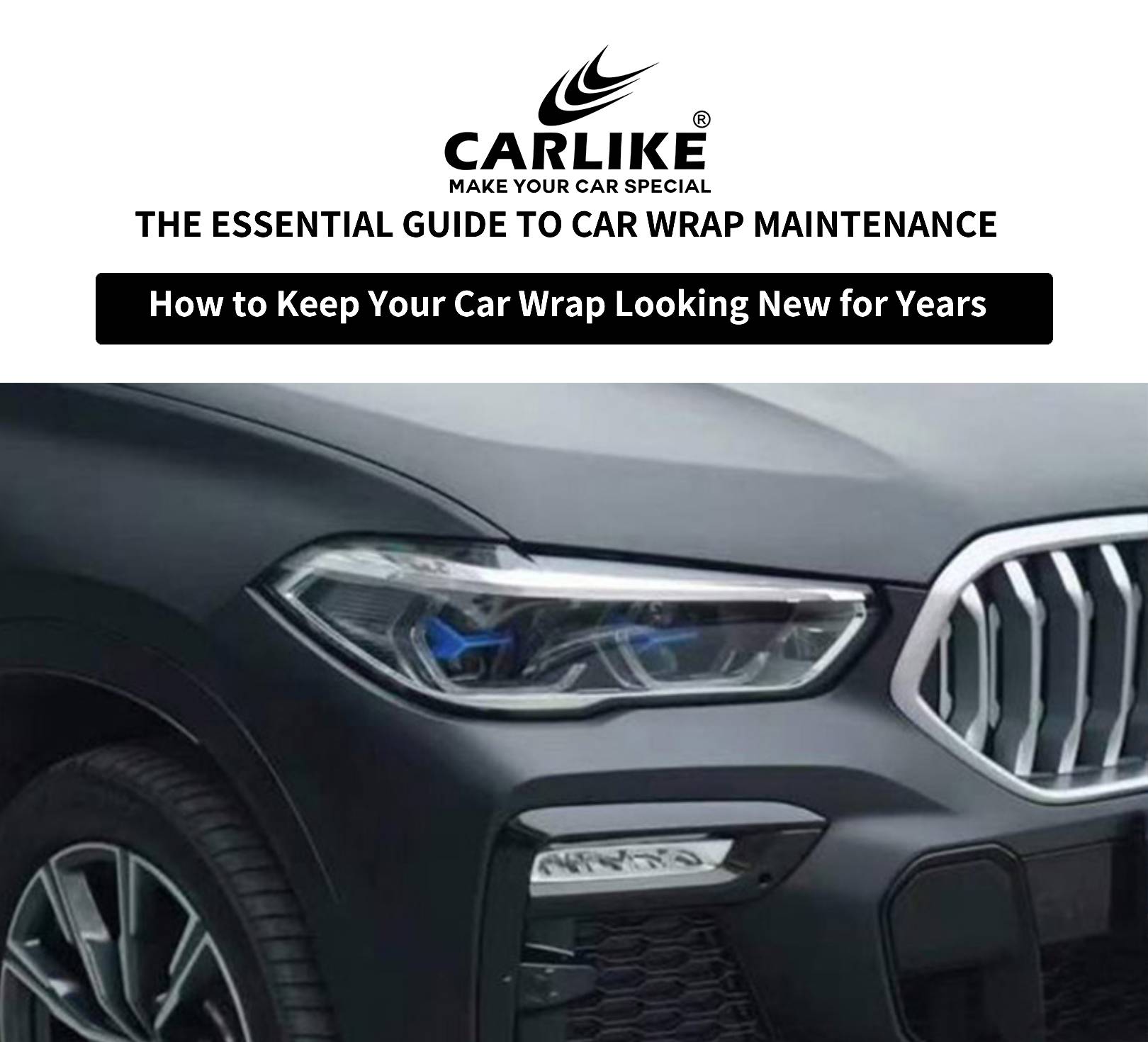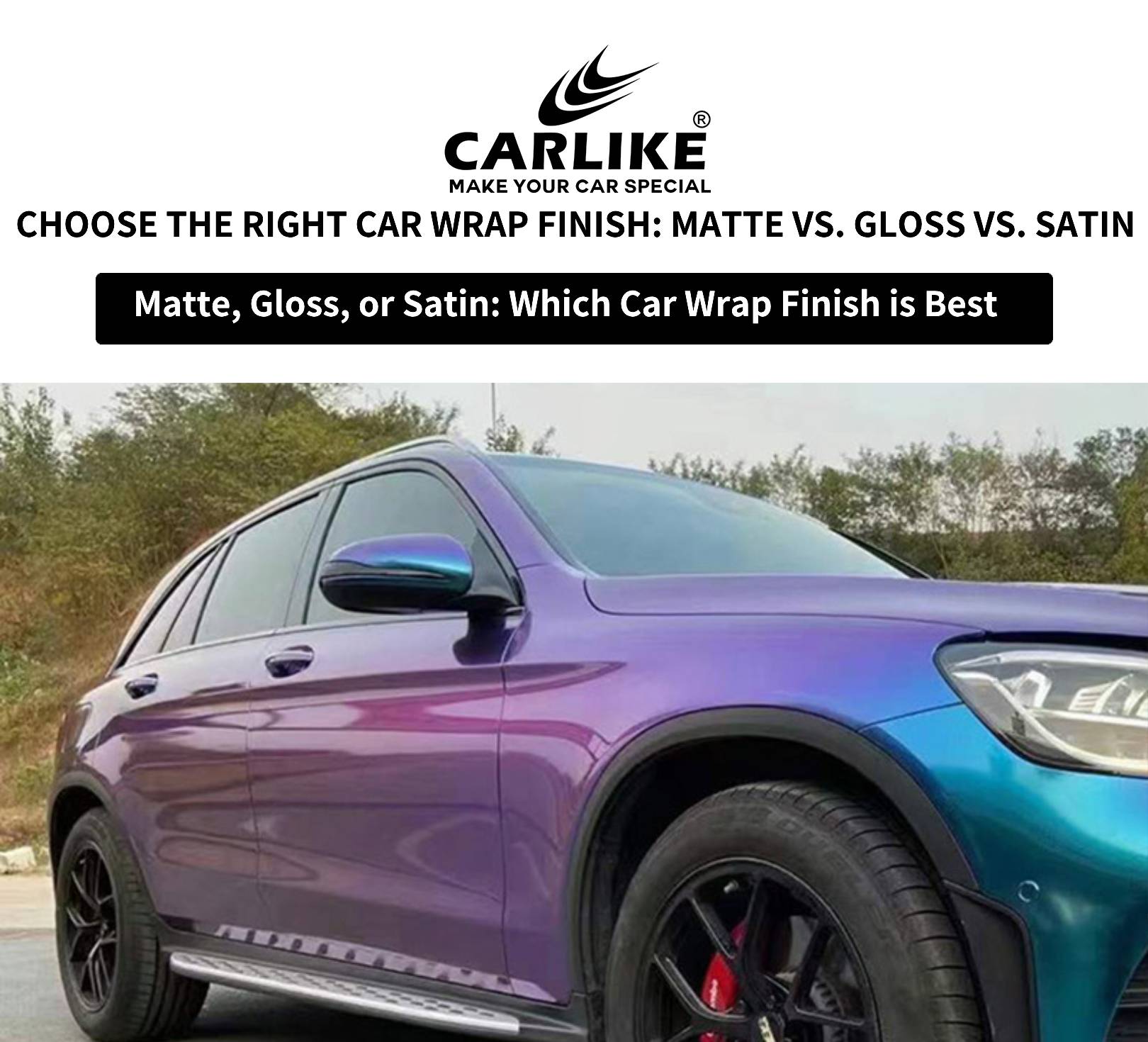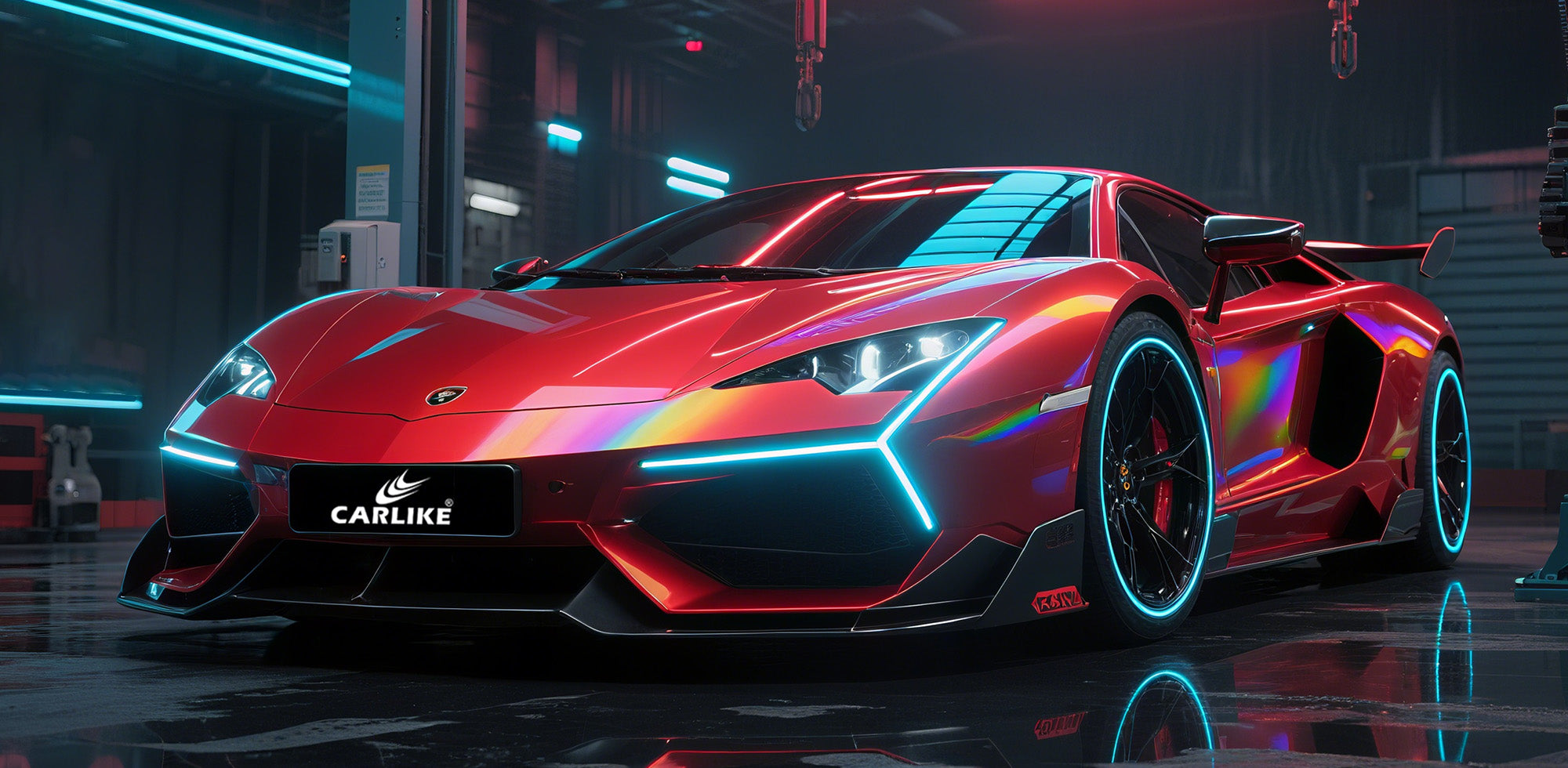DIY Process Overview of Wrapping
-
Preparation
- Choose the right vinyl wrap type (gloss, matte, etc.).
- Clean the car thoroughly; consider removing parts like handles for ease.
-
Tools Needed
- Heat gun, squeegees, utility knife, microfiber cloths, masking tape.
-
Application Steps
- Work in sections, starting with flat areas.
- Apply the wrap, smoothing with squeegee; use heat on curves.
- Trim edges carefully for a clean finish.
-
Required Skills
- Patience, attention to detail, and ability to work with vinyl smoothly.
-
Time and Cost Investment
- Full car wrap takes 20-30 hours, costs vary based on materials.
-
Final Touches
- Inspect for bubbles, allow 24-48 hours to cure.
💡ABOUT CARLIKE
CARLIKE® launched in 2012, mainly focus on premium car wrapping vinyls, with rich colors and stylish designs. High performance with economic price is always the persuit of CARLIKE®.
CARLIKE-Make Your Car Special.
Professional Installation Benefits
Expertise and Experience : Professional installers bring years of experience and specialized training in applying car wraps, ensuring a high standard of work. They know the intricacies of different vehicles, including tricky areas like curves, edges, and contours, which can be challenging for amateurs.
Quality Control : Professional services often include a rigorous quality assurance process, ensuring every inch of the wrap is smooth, bubble-free, and aligned. This results in a clean, seamless finish that enhances the vehicle's aesthetic appeal.
Reduced Risk of Mistakes : DIY installations can lead to common issues such as air bubbles, wrinkles, or misalignment. Professionals use specialized tools and techniques to minimize these risks, reducing the chances of costly mistakes that may require reinstallation or repairs.
Enhanced Durability and Longevity : Proper installation by a professional can increase the lifespan of the wrap, as they ensure precise adhesion and finish. This can lead to better resistance to peeling, cracking, and other wear-and-tear issues over time.
Warranty and Support : Many professional installers provide a warranty on their work, offering peace of mind for any issues that may arise post-installation. This ensures that if any defects occur, they can be addressed without additional cost.
Overall, professional installation guarantees a level of precision, quality, and durability that’s challenging to achieve with DIY methods, protecting both the look and the longevity of your vehicle wrap.

😍PRODUCT ADVANTAGE
1. SUPER STRETCH
CARLIKE® vinyl is made by high polymeric pvc wrap.The wrap with very high stretch, easily for the curves and full car body wrap.
2. INCREDIBLE RESTORABLE
When you use the film, if the film wrinkled, heating membrane can be restored.
3. REMOVABLE GLUE
Solvent-based acrylic low viscosity glue, Professional honeycomb air channels, After remove non residual glue, Do not damage the original paint.
Cost Comparison
1. Materials Cost
DIY:
- Wrap Film: $400 - $1,000, depending on wrap quality and size of the vehicle.
- Application Tools: $50 - $150 for essential tools like squeegees, knives, heat guns, and gloves.
Hidden Cost: Inexperienced installers may need extra film to correct mistakes, adding up to $100 - $200.
Professional:
- Wrap Film and Labor Package: $1,500 - $5,000, with premium wraps (e.g., chrome or carbon fiber) costing more.
No additional material costs are usually required, as professionals provide the tools and expertise.
2. Tool Costs
DIY:
- Initial Tool Purchases: $50 - $150 for a complete set of wrapping tools.
- Specialty Tools: $30 - $80 for optional tools like wrap magnets or infrared thermometers for consistent heat application.
Hidden Cost: DIY installations may require re-purchasing tools if damaged or inadequate.
Professional:
- Tools Included in Cost: Professionals have all necessary tools, so there are no additional tool costs.
3. Time and Labor Cost
DIY:
- Labor Time: 15 - 30 hours, depending on skill and vehicle complexity.
- Personal Labor Value: Estimated at $0, but consider potential loss of time, especially if self-employed or requiring vacation time.
Hidden Cost: Time spent on troubleshooting errors or redo sections if improperly applied.
Professional:
- Labor Time for a Shop: 1 - 3 days for completion, all inclusive.
- Convenience Factor: Allows you to continue with daily activities while the wrap is completed professionally.
4. Error Correction Costs
DIY:
- Redo Materials: $100 - $300 for reordering additional wrap film.
- Professional Assistance (if needed): If errors are severe, correcting them professionally may cost an additional $200 - $500.
Hidden Cost: Mistakes in wrapping complex areas, like mirrors and bumpers, may require added tools or assistance.
Professional:
- Warranty or Free Touch-ups: Many professional installers offer warranties or free minor touch-ups.
- No Redo Cost: Professional installs often reduce the risk of major errors, eliminating significant redo costs.
5. Total Estimated Costs
| Category | DIY | Professional |
|---|---|---|
| Wrap Film | $400 - $1,000 | Included in package |
| Application Tools | $50 - $150 | Included in package |
| Potential Error Costs | $100 - $500 | Usually none, or covered |
| Total DIY Cost Range | $550 - $1,650+ | $1,500 - $5,000+ |
Key Takeaways:
DIY Installation can be significantly cheaper upfront but has hidden costs tied to purchasing tools, materials, and potential mistakes. The time commitment is considerable and may not be ideal if you lack prior experience.
Professional Installation is more expensive, but it includes labor, tools, and often a warranty. Professionals provide faster, quality-assured installation, with fewer risks of needing costly corrections.

When to Choose Each Option
1. Budget
-
DIY Installation:
- Cost-Effective : If you're on a tight budget, DIY installation can be significantly cheaper. The only costs you'll need to factor in are the materials (vinyl wrap, tools, etc.).
- Considerations : Be aware that you might need to buy specialized tools (like heat guns or squeegees) if you don’t already have them.
-
Professional Installation:
- Higher Cost : Professional installation will typically cost more because you’re paying for expert skill and labor.
- Considerations : While the upfront cost is higher, professional installers can ensure a higher-quality finish and avoid costly mistakes that could require reapplication.
2. Experience Level
-
DIY Installation:
- Beginner-Friendly (with Patience) : If you're a beginner, a simple wrap with fewer curves (such as a flat panel) might be manageable. However, it can be tricky if you're new to vinyl wrapping, as it requires attention to detail and precision.
- Learning Curve : You can find tutorials online, and there are various kits that make DIY installation easier.
-
Professional Installation:
- Recommended for Complex Projects : If you lack experience, professional installers are the best option. Complex wraps, such as intricate designs or covering vehicles with lots of curves, require advanced skills and tools.
3. Car Complexity
-
DIY Installation:
- Simple Cars (Flat Surfaces) : If your vehicle has fewer curves, like sedans or trucks, a DIY installation might work well, especially for a full wrap.
- Challenges : The more complex your car’s shape, the harder it will be to get smooth, wrinkle-free results. You’ll need to be especially cautious around mirrors, bumpers, and handles.
-
Professional Installation:
- Curvy or Detailed Cars : Vehicles with complex shapes, such as sports cars, or ones with intricate body features (e.g., side mirrors, bumpers, grills) are best handled by professionals.
- Ensured Precision : Professionals have the experience and tools necessary to ensure that every curve and detail is covered perfectly.
Final Verdict:
- Choose DIY if : You’re on a budget, have some time to practice, and your car has simple surfaces.
- Choose Professional Installation if : Your car has complex curves or intricate details, you want to avoid mistakes, and you’re willing to invest a bit more for a professional finish.





